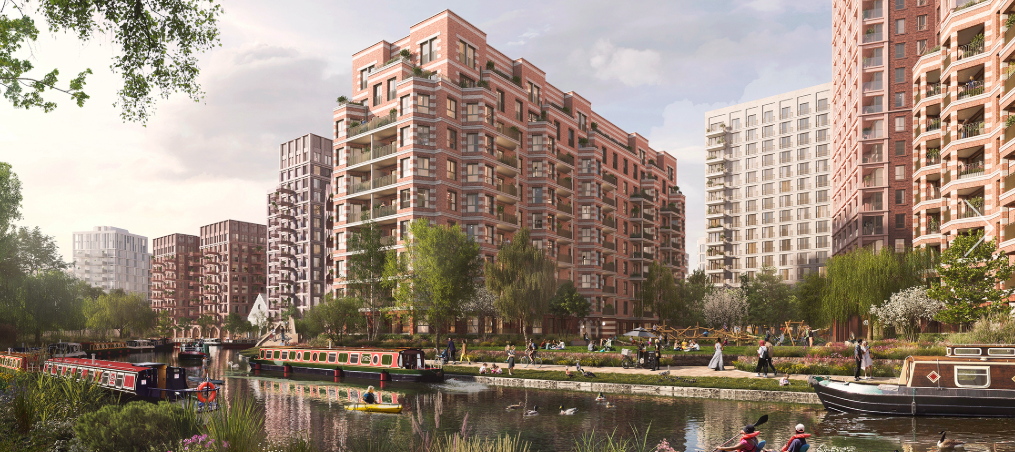IRISH developer Ballymore has said the Notting Hill Carnival — one of Europe’s largest street festivals — will be safeguarded throughout the course of their major redevelopment it is undertaking in west London.
In a statement they say: “Working closely with the local communities over the last three years, we have shaped our plans going forward to include the canal as a central feature of the development."
Ladbroke Grove, Canal Way, London W10 5AA, the £2 billion project is a joint venture with UK supermarket giant Sainsbury’s. It aims to transform a 19-acre brownfield site in Ladbroke Grove into a new canalside neighbourhood with more than 2,500 homes, retail units, and community spaces.
The site, currently used as part of the carnival's operations, includes areas for staging and the J’Ouvert morning celebration, a traditional opening event involving dancing, music, and colourful displays. Ballymore has stated that construction teams will work with organisers each year to ensure adequate facilities are maintained during the August bank holiday weekend when the carnival takes place.
 Architect's impression of Ladbroke Grove Canal Way, London W10 5AA (image courtesy of Ballymore)
Architect's impression of Ladbroke Grove Canal Way, London W10 5AA (image courtesy of Ballymore)Planning documents filed with the Royal Borough of Kensington and Chelsea (RBKC) suggest that the development — dubbed Project Flourish — has been “designed with a conscious effort to retain the carnival both during the construction programme and in the future.”
Once the project is complete, the carnival will be welcomed into the heart of the new neighbourhood, with updated infrastructure intended to support staging areas and public celebrations.
The development overlooks Kensal Green Cemetery, adjacent to St Mary’s Catholic Cemetery, London’s most historic graveyards and the final resting place for generations of the city’s Irish community — many of whom settled in the area from the 19th century onwards. Both cemeteries remain important cultural landmarks for Irish families in London.
However, the proposals have not been without controversy. Local residents and campaigners have raised objections over the remediation of the former gasworks site, where contamination issues have lingered for years, and over the density and height of some of the proposed buildings.
RBKC has yet to issue a final decision on the planning application, despite expectations that one would be made last year. A public consultation on the latest revisions is open until 15 May 2025.
The Greater London Authority has also raised concerns, noting that the affordable housing provision falls below the Mayor of London’s targets. Planning officers cited issues around fire safety, transport, and the quality of design — particularly in relation to single-aspect homes and access to natural light.
In a recent update, Ballymore said it had made “minor adjustments” to its submission in response to community and council feedback, including improved pedestrian and cycle access around Ladbroke Grove and enhanced public spaces.
A spokesperson for the company said it was committed to developing a scheme that would deliver “maximum benefits for everyone within the Kensal Canalside Opportunity Area.”
The company’s UK arm, which is controlled by Irish businessman Seán Mulryan, returned to profit last year with £1.3 million in post-tax earnings, following a £5 million loss the year before. Turnover nearly doubled to £28.7 million, largely due to costs recharged across the wider group.
While the developer has a long record of tackling complex brownfield sites, the sensitivity of this location — both in terms of heritage and environmental concerns — means scrutiny is likely to continue.
 FILE PHOTO 2015 Sean Mulryan, founder of Ballymore (RollingNews.ie)
FILE PHOTO 2015 Sean Mulryan, founder of Ballymore (RollingNews.ie)Ballymore — overview
Ballymore is a property development company founded by Irish businessman Seán Mulryan. Headquartered in Dublin, the firm is known for large-scale, design-led urban regeneration projects across Ireland and the UK. It has played a central role in shaping major parts of London’s Docklands and is behind landmark developments such as Embassy Gardens in Nine Elms and Brentford Project in west London. Ballymore specialises in complex brownfield sites and often collaborates with local authorities and partners like Sainsbury’s. Despite occasional controversy, it remains one of the most prominent Irish-led developers operating internationally, with a reputation for bold architectural ambition and placemaking.

